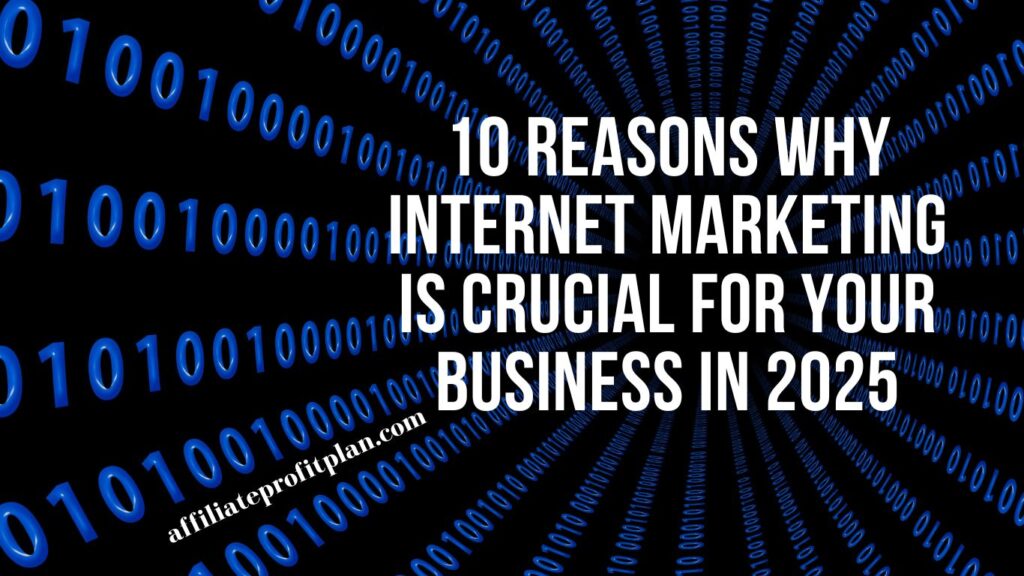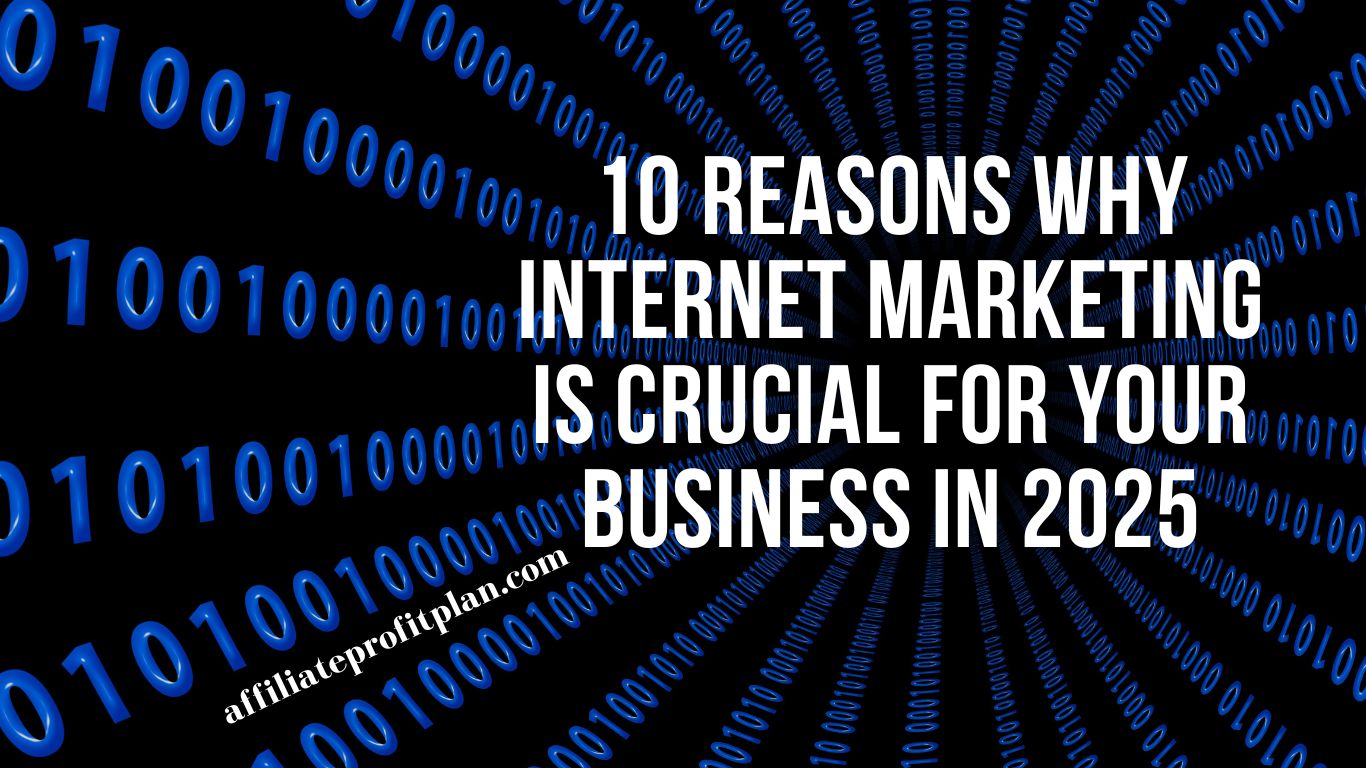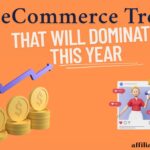Welcome to my article 10 Reasons Why Internet Marketing is Crucial for Your Business in 2025. In the good ol’ days, businesses could thrive with a catchy TV jingle, a few billboards, and maybe a radio spot or two. Fast forward to 2025, and the world of marketing has gone completely digital. From social media scrolls to Google searches, your customers are living online, and if your business isn’t there to meet them, you’re essentially invisible. Let’s face it: internet marketing is no longer just a “nice-to-have”—it’s a must-have for any business that wants to stay relevant and competitive in this fast-paced, digital-first world.
In this article, we’re diving into 10 compelling reasons why internet marketing is an absolute game-changer for your business in 2025. Spoiler alert: if you’re not already embracing digital marketing, your competitors probably are, and they’re winning. So, let’s break it down and make sure your business isn’t left in the dust!
Access My Proven Blueprint for $50-$100 Daily Income – Watch This FREE Video Now >>>

Increased Online Presence Equals Greater Visibility
Let’s be real: if your business isn’t online in 2025, it’s like throwing a party and forgetting to send out invitations. Your customers are searching the web, scrolling social media, and binge-watching YouTube videos. If you’re not in front of them, they’re probably finding your competitor who is. In today’s digital age, increased online visibility isn’t just a perk—it’s the ticket to staying in the game.
Why is this so important? Well, consider this: more than 90% of people research products and services online before making a purchase. That means if you’re not showing up on search engines, social media, or in your customer’s feed, you’re missing out on all that traffic—and potential revenue. With the rise of Google, YouTube, Instagram, and even TikTok, consumers now expect businesses to have a solid online presence. Whether it’s through engaging content, targeted ads, or organic social media posts, being visible is your first step to building a relationship with future customers.
Search engine optimization (SEO) plays a major role in ensuring your website ranks high on Google, meaning when customers type in relevant search terms, your business shows up. And let’s be honest, who scrolls to page two of Google results? (Okay, maybe your mom does when she’s researching how to bake a cake, but for real, page one is where the magic happens.) By investing in SEO and optimizing your content, you’re increasing the chances of your business being discovered when potential customers are actively searching for what you offer.
On top of that, social media platforms have evolved into powerful marketing tools, allowing businesses to create highly engaging content that drives brand awareness. From Instagram stories to Facebook ads and TikTok challenges, being active on social platforms ensures you’re staying in front of your audience consistently. And if you’re really clever with your content, your brand can go viral. Yes, viral! (But no pressure, right?)
In short, the more places you show up online, the greater your chances of being seen, heard, and remembered. The digital world is your oyster—get out there and start shucking!
Cost-Effectiveness Compared to Traditional Marketing
Let’s talk dollars and cents for a second. If you’ve ever had to fork out a small fortune for a print ad in a local magazine or shelled out big bucks for a 30-second TV spot, you know traditional marketing can quickly break the bank. Now, what if I told you that in 2025, internet marketing is not only more effective—it’s also way more budget-friendly? Yeah, I know, it sounds like a marketing myth, but stick with me here.
First off, internet marketing lets you stretch your marketing dollars further than a stretched-out rubber band. Take pay-per-click (PPC) advertising, for instance. You’re only paying for the clicks you get—no more paying for space in a magazine that gets tossed into the recycling bin without a second glance. When you target the right audience with well-crafted ads, you’re paying for results, not just exposure. So, you can make every dollar count and only invest in ads that actually lead to conversions. How’s that for a money-smart move?
Then there’s the beauty of organic strategies like SEO and content marketing. If you’re investing in creating valuable, engaging content, you’re building long-term assets that work for you around the clock. A blog post, a well-optimized landing page, or a YouTube tutorial can continue to generate traffic and leads months, even years after it’s published. Contrast that with the fleeting nature of a traditional ad—one and done. Internet marketing allows you to keep leveraging your content over time, meaning the return on investment (ROI) only improves as your online presence grows.
And let’s not forget about social media. Advertising on platforms like Facebook or Instagram is not only incredibly affordable but allows for highly targeted campaigns. Want to market to people who just moved to a new city? Or those obsessed with cat videos? With the precision of digital advertising, you can target audiences based on location, interests, behavior, and more, meaning your message goes to the right people at the right time—and at a fraction of the cost of traditional marketing.
When you consider that you can track every penny you spend and adjust strategies on the fly, it’s clear: internet marketing is the smart, cost-effective choice for businesses in 2025. So, why keep spending big bucks on billboards and TV ads when you can get better results for less online? It’s like finding a $20 bill in your jeans pocket—except this time, it’s your marketing budget that’s reaping the rewards.
Data-Driven Decision-Making Improves Strategy
Data—it’s the secret sauce of modern marketing, and if you’re not using it, you might as well be throwing spaghetti at the wall and hoping something sticks. In 2025, successful internet marketing isn’t about guessing and hoping for the best. It’s about using real, concrete data to shape your strategies and make smarter decisions. Think of it like being handed a map to your customers’ brains—it’s a no-brainer to use it, right?
Access My Proven Blueprint for $50-$100 Daily Income – Watch This FREE Video Now >>>
Gone are the days when marketing decisions were based on gut feelings or vague assumptions. Now, you’ve got a treasure trove of data at your fingertips. With tools like Google Analytics, social media insights, and email marketing stats, you can track how customers interact with your content in real time. Are people engaging with your posts? Do they click through your email campaigns? Which products are getting the most clicks on your website? All of these questions can be answered with just a few clicks, giving you the power to adjust your strategy on the spot.
But it gets better. Data-driven decision-making helps you move beyond simple tracking. It’s about understanding customer behavior—figuring out why they click, buy, or leave without making a purchase. Are they abandoning their cart halfway through the checkout process? Maybe it’s because your shipping fees are too high, or the checkout process feels like a maze. By analyzing your data, you can identify and fix these pain points before they cost you sales. It’s like being a marketing detective, and you’ve got all the clues right in front of you.
Another big win? A/B testing. This handy technique allows you to compare different versions of your content (think email subject lines, landing page designs, or ad creatives) to see what resonates best with your audience. Want to know if a funny meme works better than a formal product description? Test it out! Data lets you experiment, tweak, and optimize without risking your entire marketing budget on a hunch.
In short, using data to inform your decisions means you’re no longer flying blind. You’re crafting tailored, effective marketing campaigns that speak directly to your audience’s preferences and behaviors. With data on your side, you’re not just keeping up with the competition—you’re leaving them in the digital dust.
Targeted Marketing Reaches the Right Audience
Ever try to sell winter coats to people living in the desert? Yeah, that’s pretty much the marketing equivalent of shouting into the void. Without targeted marketing, you’re essentially casting a wide net and hoping to catch something. But here’s the truth: not every person who stumbles across your ad is going to be your ideal customer. In fact, most of them won’t be. And that’s a shame because, in 2025, technology gives us the tools to reach the right people—those who are actually interested in what you’re selling.
Targeted marketing is like the GPS of your advertising campaigns. You can pinpoint the exact audience that’s most likely to convert, whether they’re browsing on social media, watching YouTube, or Googling for solutions to their problems. How? With data! With the help of advanced targeting options on platforms like Facebook, Instagram, Google Ads, and even LinkedIn, you can zero in on people based on their interests, behaviors, demographics, and even past interactions with your business. It’s like giving your marketing a laser focus instead of just blasting it into the digital ether and hoping it hits something.
Here’s an example: Imagine you’re a local gym owner offering a new fitness class. Instead of running a general ad that shows up on the feeds of people who live nowhere near your gym, you can target people who have recently shown interest in fitness, live in your area, and have engaged with similar health-related content online. Sounds pretty great, right? You’re not wasting your budget on people who don’t fit your target demographic. You’re speaking directly to the folks who are most likely to walk through your door and sign up for that class.
Even better, with the power of retargeting, you can show ads to people who’ve already interacted with your business. Did someone visit your website and check out your product page without buying? Show them an ad with a special offer. Did someone abandon their shopping cart? Time for a friendly reminder! Targeted marketing lets you keep the conversation going with people who’ve already expressed interest, giving you a much higher chance of converting them into paying customers.
At the end of the day, targeted marketing helps you get the most bang for your buck. It ensures that your ad dollars are spent on reaching people who are genuinely interested in what you have to offer. No more wasting time or money on ads that go unnoticed. In the world of digital marketing, targeting is key—get it right, and you’ll be in front of the people who count.
Staying Competitive in a Digital-First World
In a world where everyone’s glued to their phones, tablets, or computers 24/7, not having a strong digital presence is like trying to run a marathon in flip-flops. Sure, you might make it a few steps, but you’re not going to win the race. In 2025, the digital world isn’t just a place for casual browsing—it’s where consumers make decisions, share opinions, and discover new brands. If your business isn’t showing up in the right digital spaces, you’re not just missing out on customers—you’re practically inviting your competition to take the lead.
So, what does it take to stay competitive in this digital-first world? First off, it’s all about embracing the tools and platforms that are now essential to business success. From social media to search engines, your customers are online, and they’re engaging with brands in ways that wouldn’t have been possible just a decade ago. If you’re still relying solely on traditional methods like print ads or word-of-mouth, you’re going to find yourself falling behind fast.
The key to staying competitive is digital agility. Being flexible and quick to adapt to new trends and technologies gives you a serious edge. Take the rise of artificial intelligence, for example. AI isn’t just for tech companies anymore—it’s now a crucial tool for automating tasks, analyzing customer behavior, and personalizing your marketing efforts. If your competitors are using AI to refine their strategies and improve customer experiences, you’re at a disadvantage if you’re not in the game.
Social media also plays a massive role in staying competitive. Platforms like Instagram, TikTok, and YouTube are more than just places to post cute pet videos; they’re now essential marketing tools where businesses can engage directly with customers, build brand loyalty, and even drive sales. Having a strong social media presence not only increases your visibility but also humanizes your brand, making it easier to connect with your audience on a personal level. After all, who’s going to buy from a business they’ve never heard of?
And let’s not forget about SEO. In a world of endless content, appearing on page one of Google search results is essential to driving traffic to your website and generating leads. If you’re not investing in SEO, your competitors—who are actively optimizing their websites—will be the ones that show up when potential customers search for your products or services. Trust me, you don’t want to let them steal your spotlight.
Ultimately, staying competitive in a digital-first world means continually evolving, testing new strategies, and being willing to embrace the ever-changing landscape of the internet. The world is moving fast, and if you’re not keeping up, you’re not just risking losing business—you’re at risk of being forgotten. So, stay on your toes, adapt, and always be ready to innovate. Your customers are online, and so should you be!
Conclusion: Embrace the Digital Future or Get Left Behind
Well, here we are—at the end of the article, but the beginning of your journey toward a thriving digital presence. If the thought of competing in 2025’s digital-first world feels a little daunting, don’t worry. You’re not alone. Every business, big or small, is facing the same challenges. But the key takeaway here is this: internet marketing isn’t just a trend or a “nice-to-have” anymore—it’s an absolute must. If you want your business to stay relevant, grow, and, let’s be real, survive in 2025 and beyond, embracing the power of the digital landscape isn’t optional—it’s a necessity.
Access My Proven Blueprint for $50-$100 Daily Income – Watch This FREE Video Now >>>
From the rise of AI and the growing importance of voice search optimization to the rise of social commerce and the focus on sustainability, there’s no denying that the digital world is changing fast. But here’s the good news: each of these trends provides an opportunity for you to step up your game. With the right strategies, you can not only keep up with the competition—you can leave them in the dust.
In a world that’s constantly evolving, staying competitive is all about being proactive, not reactive. It’s about staying informed, adapting quickly, and continuously optimizing your marketing efforts. The businesses that succeed in 2025 will be the ones that don’t just embrace change, but that thrive on it. And as daunting as that might sound, just remember: digital marketing tools and strategies are all around you, ready to help you succeed. You don’t have to go it alone.
So, here’s your call to action: If you haven’t already, it’s time to step into the digital arena with confidence. Whether it’s harnessing the power of data, experimenting with new content strategies, or diving into social commerce, the world of internet marketing in 2025 offers endless possibilities. But don’t wait too long—those competitors of yours? They’re already one click ahead. Stay ahead of the curve, embrace the future of marketing, and let your business shine in the digital spotlight.
Thanks a lot for reading my article on “10 Reasons Why Internet Marketing is Crucial for Your Business in 2025″ till the end. Hope you’ve helped. See you with another article.










